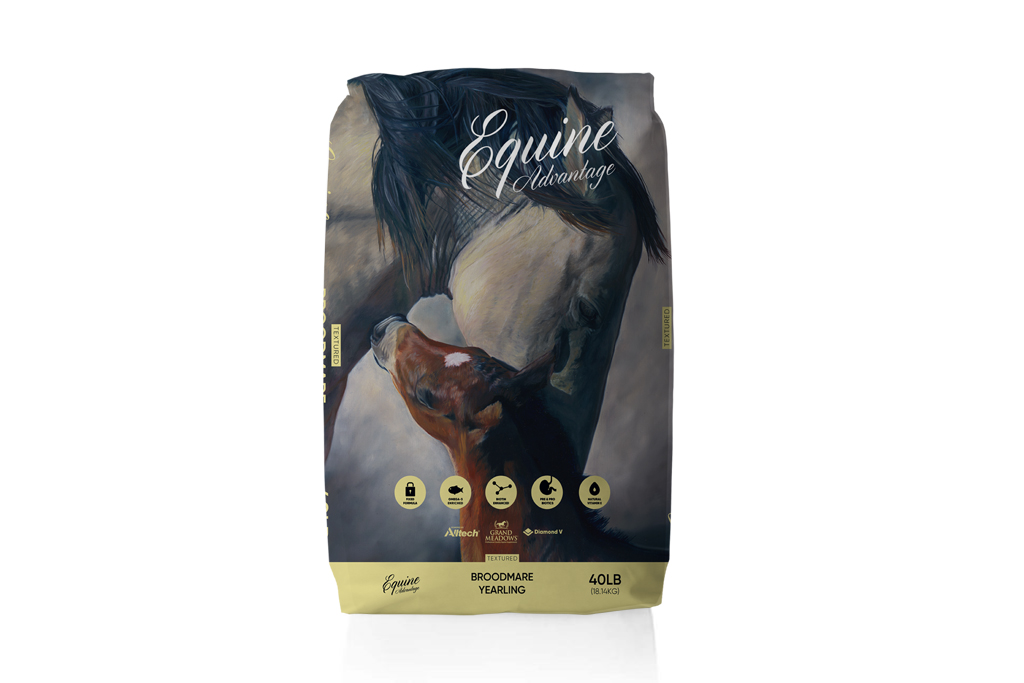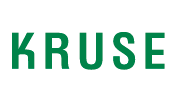
Equine Advantage Broodmare/Yearling
Available in a 40 lb. bag
A textured feed that is designed for pregnant and lactating mares, breeding stallions, along with growing horses and ponies. Fortified with Grand Meadows supplement for the overall health and immune system of your horse. Formulated to promote healthy growth and bone development in weanling and yearling horses. Helps to provide essential nutrients needed during breeding activities. Includes optimal levels of non-structured carbohydrates (NSC).
List of Ingredients:
Recleaned Whole Oats, Rolled Barley, Dehulled Soybean Meal, Cane Molasses, Suncured Alfalfa Meal, Wheat Middlings, Soybean Oil, Calcium Carbonate, Monocalcium Phosphate, Dicalcium Phosphate, Flaxseed Meal, Dried Saccharomyces cerevisiae fermentation solubles, , Potassium Chloride, Iron Proteinate, Zinc Proteinate, Magnesium Oxide, Vitamin E Supplement, d-Alpha Tocopheryl Acetate, Manganese Proteinate, DL-Methionine Hydroxy Analogue, Choline Chloride, Silicon Dioxide, L-Lysine, Ascorbic Acid, Copper Proteinate, Niacin, Citric Acid, Natural Mixed Tocopherols, Rosemary Extract, Natural and Artificial Flavors added, Sodium Selenite, Biotin, Folic Acid, Riboflavin Supplement, Thiamine Mononitrate, Calcium Pantothenate, Carotene, Vitamin A Supplement, Pyridoxine Hydrochloride, Vitamin B-12 Supplement, Ethylenediamine Dihydriodide, Cobalt Sulfate, Vitamin D3 Supplement, Rice Bran, Salt, Manganese Sulfate, Zinc Sulfate, Copper Sulfate, Selenium Yeast, Ferrous Sulfate, Calcium Iodate, Brewer’s dried yeast, hydrated sodium calcium aluminosilicate, Propionic Acid (a preservative), Diatomaceous Earth, Lignin Sulfonate, Potassium Calcium Magnesium Clinoptilolite (Natural Zeolite).
Feeding Instructions:
Each horse is unique and should be fed to maintain desired body condition and performance. Feeding rates need to be adjusted according to the horse’s condition and training or competition schedule. Split the recommended feeding levels into two or more feedings each day.
| Feeding Situation | Guidelines |
| Maintenance/Early Gestation | Feed 0.25 to 0.5 pounds of feed per 100-pounds of bodyweight. |
| Light Exercise/Late Gestation/Breeding Stallions | Feed 0.5 to 0.75 pounds of feed per 100-pounds of bodyweight. |
| Medium Exercise/Late Lactation (3 months to weaning) | Feed 0.75 to 1.0 pounds of feed per 100-pounds of bodyweight. |
| Heavy Exercise/Late Lactation (Foaling to 3 months) | Feed 1.0 to 1.5 pounds of feed per 100-pounds of bodyweight. |
| Yearlings and 2-Year Olds | Feed 0.75 to 1.5 pounds of feed per 100-pounds of bodyweight. |
| Foals (Creep Feed)/Weanlings | Feed 1.25 to 1.75 pounds of feed per 100-pounds of bodyweight. |
Do not exceed a maximum inclusion level of 50% in the total diet so as not to exceed 0.3 PPM of added selenium per head per day. Feed along with a good, clean quality hay or pasture equivalent at the rate of 1 to 1.75 lbs per 100 lbs of bodyweight daily. Make all feeding changes gradually over a two week period. Provide plenty of fresh, clean water at all times except to hot, tired horses. Horses should be cooled out properly before having access to unlimited water or being fed. Performance horses should be fed at least twice per day and may benefit from being fed more frequently. Horses should have their feeding rate reduced when exercise is reduced. Salt should be available free choice. CAUTION: Follow label directions. Feeding added selenium at levels in excess of 0.3 PPM in the total diet is prohibited.
Guaranteed Analysis
| Crude Protein | Min. | 14.0 | % | ||
| Lysine | Min. | 1.0 | % | 4536 | MG/LB |
| Methionine | Min. | 0.2 | % | 907 | MG/LB |
| Threonine | Min. | 0.4 | % | 1814 | MG/LB |
| Crude Fat | Min. | 6.0 | % | ||
| Crude Fiber | Max. | 10.0 | % | ||
| Calcium | Min. | 0.8 | % | 3629 | MG/LB |
| Calcium | Max. | 1.3 | % | 5897 | MG/LB |
| Phosphorus | Min. | 0.6 | % | 2721 | MG/LB |
| Sodium | Min. | 0.1 | % | 453 | MG/LB |
| Sodium | Max. | 0.6 | % | 2722 | MG/LB |
| Copper | Min. | 60 | PPM | 27.2 | MG/LB |
| Selenium, Added | Min. | 0.5 | PPM | 0.23 | MG/LB |
| Selenium, Added | Max. | 0.6 | PPM | 0.27 | MG/LB |
| Zinc | Min. | 180 | PPM | 81.65 | MG/LB |
| Vitamin A | Min. | 7,000 | IU/LB | ||
| Vitamin D | Min. | 1,100 | IU/LB | ||
| Vitamin E | Min. | 150 | IU/LB | ||
| Biotin | Min. | 5.0 | MG/LB |


